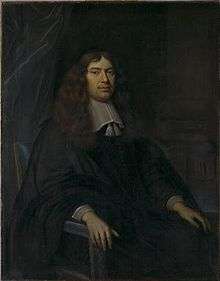Gillis Valckenier
| Gillis Valckenier | |
|---|---|
 | |
| Regent and Mayor of Amsterdam | |
|
In office 1665–1679 | |
| Preceded by | Andries de Graeff |
| Succeeded by | Johannes Hudde |
| Personal details | |
| Born |
1623 Amsterdam |
| Died |
1680 Amsterdam |
| Nationality | Dutch |
| Political party | Prince of Orange faction |
| Relations | Louis Trip (father of his wife) |
| Occupation | Regent / Mayor |
Gillis Valckenier (1623–1680) was nine years burgomaster of Amsterdam: in 1665, 1666, 1668, 1670, 1673, 1674, 1676, 1678, 1679. He was a strong personality, but changing allies as a real opportunist.
Valckenier was the son of a skipper on Leiden. He studied at the University of Leiden. In 1649 he was appointed as schepen and in 1657 as administrator of the Dutch East India Company. From 1666 onwards he was involved in the education of William III of Orange, just like Johan de Witt and Cornelis de Graeff, but in the year after he signed the Perpetual Edict (1667) ... for Preserving of Freedom, as the law was entitled, was duly passed and promogated. Its three chief points were abolition of the stadholderate, permanent separation of the captaincy-general from the stadholderate of all provinces, and the transfer of the political functions of the Stadholder of Holland to the provincial States.[1]
After the political struggle of the families De Witt and De Graeff in the rampjaar 1672, Nicolaes Witsen and Johannes Hudde were his opponents in the vroedschap. When Andries de Graeff lost his political position and Coenraad van Beuningen was sent to England as a diplomat, Valckenier was more powerful than ever. William Temple wrote in as Observations upon the United Provinces: The Turkish sultan was not as powerful in his country, than Valckenier in Amsterdam, (dressing and behaving like a shopkeeper).
A descendant of him, Adriaan Valckenier, became in 1737 a Governor-General of the Dutch East Indies.
References
- ↑ Israel, J. (1995) The Dutch Republic. Its Rise, Greatness and Fall 1477–1806, p. 791-792.